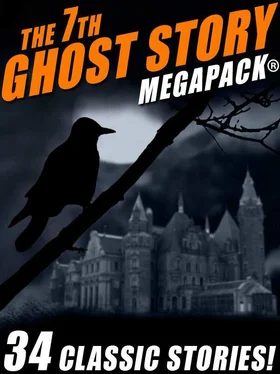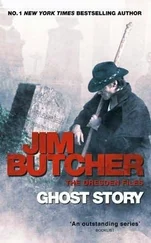“Of me?”
“We wondered what it all meant. We didn’t know you were lovers.”
“I didn’t know it myself; more’s the pity.”
“She said you were on the ice. She said you didn’t know about the big breaking up, and she cried to us that the wind was off shore. Then she cried that you could come in by the old French Creek if you only knew—?”
“I came in that way,” interrupted Hagadorn.
“How did you come to do that? It’s out of your way.”
So Hagadorn told him how it came to pass.
And that day they watched beside the maiden, who had tapers at her head and feet, and over in the little church the bride who might have been at her wedding said prayers for her friend. Then they buried her in her bridesmaid’s white, and Hagadorn was there before the altar with her, as he intended from the first. At midnight the day of the burial her friends were married in the gloom of the cold church, and they walked together through the snow to lay their bridal wreaths on her grave.
* * *
Three nights later Hagadorn started back again to his home. They wanted him to go by sunlight, but he had his way and went when Venus made her bright path on the ice. He hoped for the companionship of the white skater. But he did not have it. His only companion was the wind. The only voice he heard was the baying of a wolf on the north shore. The world was as white as if it had just been created and the sun had not yet colored nor man defiled it.
HOW HE CAUGHT THE GHOST,
by Anonymous
Taken from Twenty-Five Ghost Stories (1904).
“Yes, the house is a good one,” said the agent; “it’s in a good neighborhood, and you’re getting it at almost nothing; but I think it right to tell you all about it. You are orphans, you say, and with a mother dependent on you? That makes it all the more necessary that you should know. The fact is, the house is said to be haunted—”
The agent could not help smiling as he said it, and he was relieved to see an answering smile on the two faces before him.
“Ah, you don’t believe in ghosts,” he went on; “nor do I, for that matter; but, somehow, the reputation of the house keeps me from having a tenant long at a time. The place ought to rent for twice as much as it does.”
“If we succeed in driving out the ghost, you will not raise the rent?” asked the boy, with a merry twinkle in his eyes.
“Well, no—not this year, at any rate,” laughed the agent. And so the house was rented; and the slip of a girl and the tall lad, her brother, went their way.
Within a week the family had moved into the house, and were delighted with it. It was large and cool, with wide halls and fine stairways, and with more room than they needed. But that did not matter in the least, for they had always been cramped in small houses, suffering many discomforts; and they never could have afforded such a place as this if it had not been “haunted.”
“Blessings on the ghost!” cried Margaret, gaily, as she ran about as merry as a child. “Who would be without a ghost in the house, when it brings one like this?”
“And it is so near your school,” said the mother; “and I used to worry so over the long walk; and David can come home to lunch now, and you don’t know what a pleasure that will be.”
“It seems to me,” David gravely explained, “that if I should meet the ghost I would treat him with the greatest politeness and encourage him to stay. We shall not miss the room he takes, shall we? I think it would be well to set aside that room over yours, Maggie, for his ghostship’s own, for we shall not need that, you know. Besides, the door doesn’t shut, and he can go in and out without breaking the lock.”
And then they all laughed and had a great deal of fun over the ghost, which was a great joke to them.
They were very tired that night and slept soundly all night long. When they met the next morning there was more laughter about the ghost which was shy about meeting strangers, probably, and had made no effort to introduce himself. For the next three days they were all hard at work, trying to bring chaos into something like order; and then it was time for the school to open, and Margaret was to begin teaching, and David inserted an advertisement in the city papers for a maid-of-all-work, who might help their mother in their absence.
For one whole day prospective colored servants presented themselves and announced:
“Is dis de house whar dey wants a worklady? No, ma’am, I ain’ gwine to work in dis house. Ketch me workin’ in no ha’nted house.”
After which they each and all departed, and others came in their stead. One was secured after a while, but no sooner had she talked across the fence with a neighbor’s servant than she, too, departed.
“Never mind, children,” said Mrs. Craig, wearily, “I would much rather do the work than be troubled in this way.”
So the maid-of-all-work was dismissed and the Craig family locked the doors and went to their rooms, worn out with the day’s anxieties.
They had been in the house four days, and there had been neither sight nor sound of the ghost. The very mention of it was enough to start them all to laughing, for they were thoroughly practical people, with a fondness for inquiring into anything that seemed mysterious to them and for understanding it thoroughly before they let it go.
David was soon sleeping the sound sleep of healthy boyhood, and all was silent in the house, when Margaret stole softly into his room and laid her hand on his arm. He was not easy to waken, and several minutes had passed before he sat up in bed with an articulate murmur of surprise.
“Hush!” said Margaret, in a whisper, with her hand on his lips. “I want you to come into my room and listen to a sound that I have been hearing for some time.”
“Doors creaking,” suggested David, as he began to dress.
“Nothing of the kind,” was all she said.
They walked up the stairway, and along the upper hall to the door of the unused room. Something was wrong with the lock and the door would not stay fastened, as I have said.
Something that was not fear thrilled their hearts as they pushed the door further ajar, and stood where they could see every foot of the vacant floor. One of their own boxes stood in the middle of the room, but aside from that, nothing was to be seen, and they looked at one another in silence.
“Hold the lamp a minute, Maggie,” David said, at last, and then he went all over the room, and looked more particularly at its emptiness, and even felt the walls.
“Secret panels, you know,” he said, with a smile, but it was a very puzzled smile indeed.
“I can’t see what it could have been,” Margaret said, as they went down the stairs.
“No, I can’t see, either, but I’m going to see,” said David. “That was a chain, and chains don’t drag around by themselves, you know. A ghost could not drag a chain, if he were to try.”
“The conventional ghost very often drags chains,” said Margaret, as she closed the door of her room.
And then she lay awake all night and listened for the conventional ghost that dragged a chain, but it seemed that the weight of the chain must have wearied him, for he was not heard again.
The mother had slept through it all, and next morning they gave her a vivid account of the night’s adventure.
“Perhaps it was someone in the house,” she said, in alarm. There were no ghosts within the bounds of possibility, so far as she was concerned, but burglars were very possible, indeed.
Then Margaret and David both laughed more than ever.
“What fun it would be,” said David, “for a burglar to get into this house and try to find something worth carrying away!”
Читать дальше












